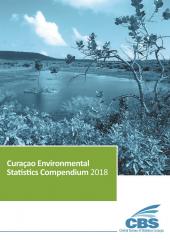Curaçao Environmental Compendium Statistics 2018

The demand for environment statistics is increasing in accordance with continuing environmental challenges faced by modern societies such as population pressure, energy issues, sustainable development and climate change. The environment is ever more present in public policies and development plans. Also in the Caribbean with its many islands and Small Island Developing States (SIDS) and so, also in Curaçao, with its high population density, unsustainable demands on solid waste infrastructure, energy-intensive and costly water, a high dependency on imported fossil fuels and a refinery which is struggling with modern environmental requirements.
The recognition that human well-being and development depends on the environment, has led to an increasing emphasis on environment and sustainability concerns (e.g. the National Development Plan Curaçao 2015) on which decisions and actions need to be taken. Paramount to these actions is the regular production of environment statistics of the highest quality. These statistics portray key information about the state of the environment and its changes through time. Furthermore, they give information to organizations, students and our society and can be used as input and support for fact-based policymaking. Like in other developing countries and SIDS, environment statistics is a new and emerging domain, which is typically endowed with limited resources (technical, financial and human) and is challenged by a developing institutional set-up and inter-institutional coordination.
This third Compendium 2018 is structured in 7 sections which include:
- Environmental conditions and quality,
- Environmental resources and their use,
- Residuals and waste,
- Extreme events and disasters,
- Human settlements and environmental health,
- Environment protection and management,
- Tourism.
